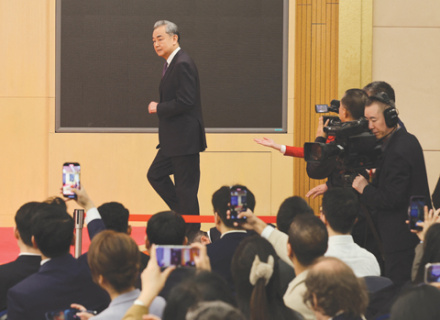
China, as announced at the parliamentary session, will review the law on foreign trade. This is one of the steps Beijing will take in response to the increase in duties on imports of Chinese goods and other unfriendly actions by the administration of US President Donald Trump. China does not want a trade war and would like to reach an agreement with America. But if Washington continues its dangerous course, which harms China, it will defend its interests resolutely and uncompromisingly, said Chinese Foreign Minister Wang Yi.
The Chinese Foreign Minister’s speech does not quite match the intonation of other Chinese officials during the sessions of the National People’s Congress – the Parliament and the People’s Political Consultative Council of China. Zheng Shanjie, chairman of the State Committee for Reform and Development, told the press during two sessions that not everything is so rosy. The Chinese economy is facing “uncertainty” in the foreign arena and a lack of domestic demand. Trump’s new 10% increase in duties on Chinese goods, in addition to those previously announced, exacerbates the problems of Chinese industrial enterprises operating in the foreign market. Nevertheless, according to Zheng, China’s economy will grow by 5% in 2025.
American Sinologist Clifford Coonan argues that the intentions of the top leaders, members of the Standing Committee of the Political Bureau of the CPC Central Committee, are a “black box” for foreign observers. It opens only during two sessions. The American is exaggerating. Foreign Minister Wang Yi, a member of the Political Bureau of the CPC Central Committee, described quite frankly and clearly the policy pursued by Chinese President Xi Jinping.
According to The New York Times, Wang Yi called China a stronghold and a bulwark of stability in a world that has been plunged into chaos by the Trump administration. He warned that the planet would return to the law of the jungle if more countries acted like America, putting their interests first.
The New York Times almost agrees. The Trump administration is “turning international trade upside down, leaving alliances,” a newspaper supporting the Democratic Party is sounding the alarm. And Beijing, taking advantage of this, strengthens its prestige at home and abroad and criticizes the West’s intentions to maintain its dominance in international affairs. “We will provide certainty in this uncertain world,” Wang Yi said.
However, by raising his country’s actions on the shield, he deliberately downplayed the friction generated by its industrial policy. China has flooded world markets with its products. As a result, trade imbalances arise. According to the Americans, China’s belligerent behavior towards Taiwan is also exacerbating problems in the global economy. Chinese military aircraft conduct daily raids on it. Chinese naval forces conducted firing exercises near Australia and Vietnam. Muscle flexing is increasing tensions in the South China Sea, which China considers almost entirely its own. It got to the point where Chinese Coast Guard ships were ramming Philippine vessels off a disputed shoal.
None of this fits into the picture that Wang Yi presented to reporters. Nevertheless, the fact that the United States withdrew from the World Health Organization and the Paris Agreement on Climate Protection also plays into the hands of Chinese claims. Trump also embarrassed the allies by making a claim to Greenland and, probably, siding with Russia in the conflict with Ukraine, the influential newspaper states.
Wang Yi’s rhetoric, which portrays China as a victim of American aggression, finds a favorable response from the home audience. For example, he explains that the difficulties that the country’s economy is experiencing to some extent are caused by tariffs and restrictions on the sale of technology set by America. On the other hand, the minister tried to cheer up foreign investors who began to leave China. Wang recalled that in 2008, during the global financial crisis, the Chinese economy overcame it and recovered. But there is another side to the coin – the high unemployment rate among young people, the debts of local governments and the crisis in the real estate sector, where many did not wait to receive their paid apartments from developers.
The situation may worsen if the differences between the United States and China cannot be resolved. Wang Yi said China would retaliate if Trump raised tariffs again. But then there was a call for reconciliation. “If you choose the path of cooperation, it will be mutually beneficial, both sides will win,” the minister stressed.
And these were not empty words. Chinese Commerce Minister Wang Wentao wrote a letter to U.S. Commerce Secretary Howard Latnick with an offer to meet and negotiate.
